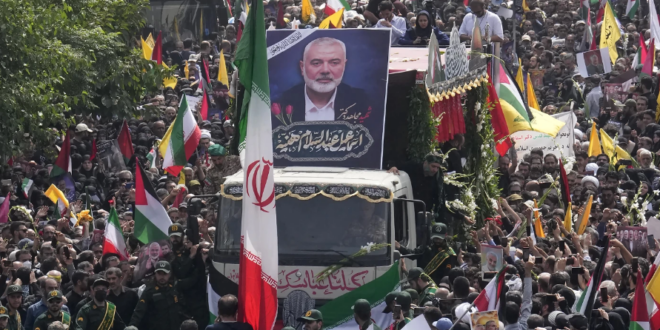Muhamad Yehia
Iran’s threatened retaliatory strike on Israel over the assassination of Hamas official Ismail Haniyeh drew major world powers into a high-wire act of diplomacy Tuesday.
Halting or limiting an Iranian strike in some eyes could bolster a monthslong effort to reach a cease-fire in a war that’s devastated the Gaza Strip and killed nearly 40,000 Palestinians, according to the territory’s health ministry. It could also free the Israeli hostages who remain captive there since Hamas’ Oct. 7 attack on southern Israel that killed 1,200 people and began the conflict.
Failure to do so could see Iran launch a complex drone-and-missile attack in tandem with Lebanon’s Hezbollah militia, now separately aggrieved over Israel’s killing of one of its top commanders, straining the ability of Israel’s missile defenses and its allies to defend against the assault. Widespread losses could push Israeli Prime Minister Benjamin Netanyahu’s hard-line government into its own direct attack on Iran — and drag the wider Middle East into a regional war.
That fear has prompted a flurry of diplomacy in the region. France, Germany, and the United Kingdom on Monday urged Iran and its allies to “refrain from attacks that would further escalate regional tensions and jeopardize the opportunity to agree (to) a cease-fire and the release of hostages.
In a call, British Prime Minister Keir Starmer warned Iran’s new reformist President Masoud Pezeshkian that there was “a serious risk of miscalculation and now was the time for calm and careful consideration.
Pezeshkian rebuffed the message.
“A punitive response to an aggressor is a right of nations and a solution for stopping crimes and aggression,” Pezeshkian said.
The new Iranian president also has been called by Cardinal Pietro Parolin, the Vatican’s secretary of state, and German Chancellor Olaf Scholz over the retaliation threat.
Pezeshkian has acknowledged he will follow the orders of Iranian Supreme Leader Ayatollah Ali Khamenei, who already said Israel “paved the way for a severe punishment upon itself with this action.”
Iran has been repeatedly targeted by suspected Israeli assassinations and sabotage campaigns, increasing the pressure on its theocracy to act to maintain its leadership position in its self-declared “Axis of Resistance” with militias it arms in the region. But it also has faced years of widespread protests, economic woes and other domestic challenges embrittling the public’s support of the government. Its first complex attack on Israel in April caused little damage, raising the risk of it needing to go larger this time in response.
The United States, Israel’s main backer, has called repeatedly on Iran not to retaliate. It also has backed efforts mediated by Egypt and Qatar to reach a cease-fire in the wider war. However, it’s also prepared militarily in the Mideast in case things do escalate.
The U.S. military has instructed the USS Abraham Lincoln aircraft carrier strike group to sail more quickly to the area. America also has ordered the USS Georgia guided missile submarine into the Mideast, while the USS Theodore Roosevelt aircraft carrier strike group has been in the Gulf of Oman. Additional F-22 fighter jets have flown into the region, while the USS Wasp, a large amphibious assault ship carrying F-35 fighter jets, is in the Mediterranean Sea
It’s not just Western powers that have been involved in recent weeks. Russian officials under President Vladimir Putin have engaged in discussions with Iran. The secretary of Russia’s national security council, Sergei Shoigu, visited Tehran and described the assassination of Haniyeh as “tragic” and something that was “impossible to bypass” in talks with Iran’s government.
Russian Deputy Foreign Minister Mikhail Bogdanov separately said Moscow was “calling on everybody to refrain from escalating the situation from turning into a disaster for all regional players,” according to the state-run Tass news agency.
“Political ways out of the existing problems must be found,” iquote .Bogdanov as saying
 موقع وجه أفريقيا موقع وجه أفريقيا هو موقع مهتم بمتابعة التطورات في القارة الأفريقية
موقع وجه أفريقيا موقع وجه أفريقيا هو موقع مهتم بمتابعة التطورات في القارة الأفريقية



